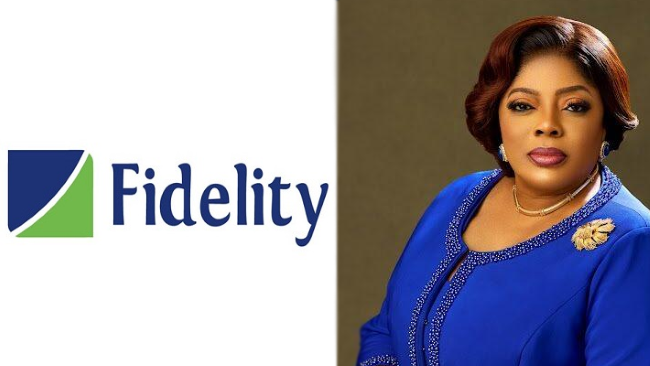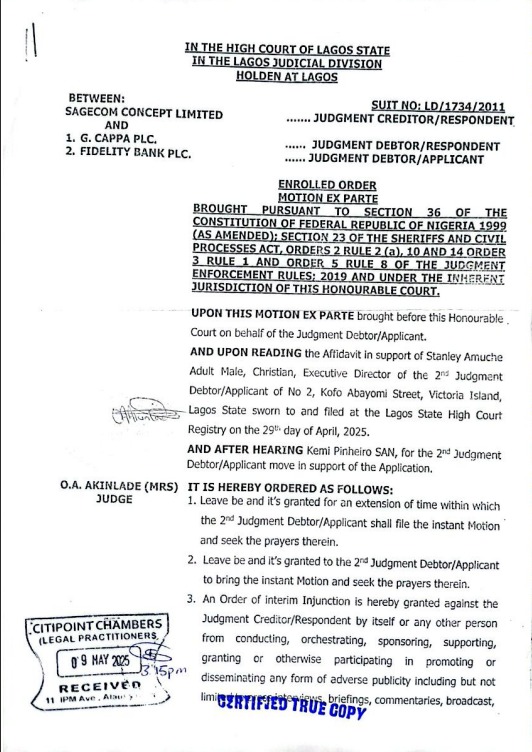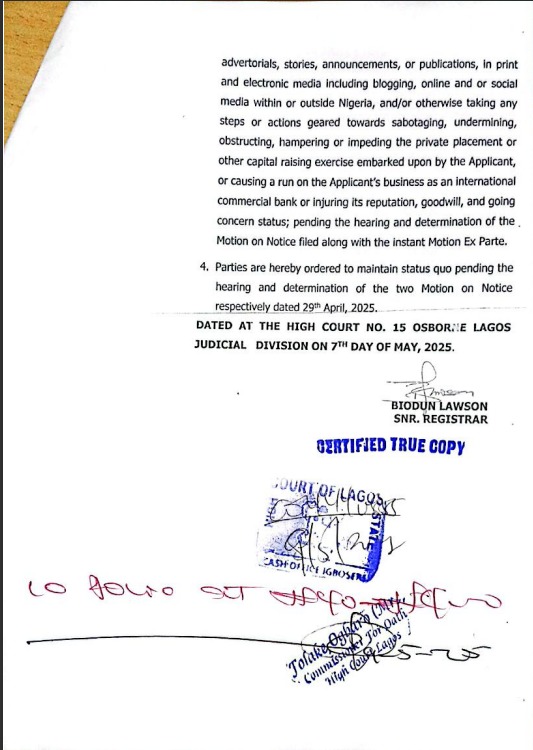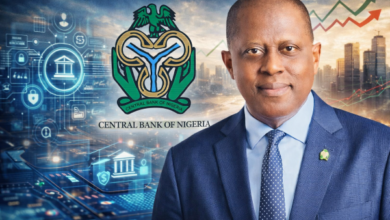Fidelity Bank Counters N225bn Supreme Court Judgment Rumour, Clarifies True Liability in Legacy G. Cappa-FSB Transaction

In what may become a textbook case of reputational risk in Nigeria’s financial services sector, Fidelity Bank Plc has issued a strongly-worded statement distancing itself from reports suggesting a ₦225 billion Supreme Court judgment was entered against it. The Tier-1 lender described such claims as grossly exaggerated, maliciously syndicated, and part of a grand campaign designed to embarrass the bank.
At the heart of the legal controversy is a legacy transaction dating back to the early 2000s—well before Fidelity Bank acquired the defunct FSB International Bank under the 2005 Central Bank of Nigeria (CBN)-driven banking consolidation exercise.
Contrary to the N225 billion figure trending in some quarters, Fidelity Bank says its internal assessment pegs its financial exposure at about ₦14 billion, and the bank remains engaged in a process of clarification and resolution in light of the Supreme Court’s judgment.
Background: The Genesis of the Dispute
The dispute dates back to 2002, when FSB International Bank—before its merger into Fidelity Bank—issued two loans to construction giant G. Cappa Plc: a $3 million foreign currency facility and a ₦100 million naira-denominated loan. These were secured against prime assets in Ikoyi and Ibadan.
By 2005, following alleged default by G. Cappa, FSB’s successor, Fidelity Bank, moved to enforce the collateral by listing the properties for sale. One of the buyers, Sagecom Concepts Limited, reportedly paid ₦350 million for some of these assets, only to later discover that the sale violated a live court injunction barring such transactions. This triggered over a decade-long legal battle spanning the Federal High Court, the Lagos Court of Appeal, and finally culminating in an April 2025 judgment of the Supreme Court of Nigeria.
Supreme Court Ruling: A Landmark Judgment on Equity and Corporate Conduct
In a unanimous ruling, the Supreme Court held that Fidelity Bank acted contrary to a subsisting court order by proceeding with the sale of assets to Sagecom. Delivering the lead judgment, Justice Adamu Jauro noted that:
“Allowing the appellant to escape liability… would be tantamount to allowing it to benefit from its own wrong.”
The apex court thus upheld damages in favour of Sagecom, which had borrowed the ₦350 million at an annual interest rate of 19.5% from FMCB to finance the purchase of the disputed assets.
Fidelity Bank had attempted to shield itself by arguing that G. Cappa remained in control of the assets and continued collecting rents despite the injunction. However, the court ruled that this did not absolve Fidelity from the consequences of breaching judicial directives.
Fidelity’s Position: Legacy Burden, Not Bankruptcy
In its official statement, Fidelity Bank emphasized that the judgment stemmed from a pre-consolidation transaction involving FSB, and that the matter has been grossly distorted by fake news merchants. The bank maintains that:
- Its actual financial obligation is nowhere near ₦225 billion;
- The reports suggesting bankruptcy are false, mischievous, and aimed at causing panic;
- The bank remains one of Nigeria’s most capitalized, profitable, and resilient financial institutions, as confirmed by its Q1 2025 results.
Indeed, Fidelity’s quarterly filings with the Nigerian Exchange Group (NGX) show robust earnings, a healthy non-performing loan (NPL) ratio, and an expanding retail and digital footprint.
The Bigger Picture: Reputation Management in the Age of Legal Overhangs
This episode throws into sharp relief the complex risks Nigerian banks face from legacy liabilities, particularly those inherited during the chaotic consolidation era of the mid-2000s. It also underlines the critical importance of robust legal due diligence, injunctive compliance, and reputational risk management, especially in a digital media ecosystem where misinformation can spread faster than facts.
More broadly, the Fidelity-G. Cappa-Sagecom saga is a cautionary tale for institutional investors and boards: that corporate accountability does not end with acquisition. Legal obligations—even if inherited—must be approached with rigour, transparency, and a full appreciation of the long tail of litigation risk.
Conclusion: A Wake-Up Call for Nigeria’s Financial Ecosystem
While Fidelity Bank’s exposure appears far more limited than speculated, the reputational damage could have been worse in the absence of a swift, coordinated response. This development also calls for greater journalistic responsibility in financial reporting and a more proactive stance by regulators like the CBN in helping institutions manage legacy issues transparently.
For now, Fidelity Bank has reaffirmed its stability, solvency, and operational strength, but the incident serves as a sobering reminder that legacy debts can become reputational liabilities—even two decades later.
BRANDECONOMY will continue to monitor and provide informed analysis on developments around the Supreme Court enforcement and the broader implications for corporate governance in Nigeria’s financial sector.














